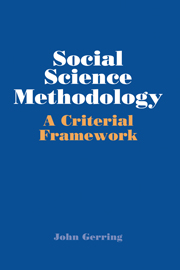Book contents
7 - Causation
Published online by Cambridge University Press: 05 June 2012
Summary
Surely, if there be any relation among objects which it imports to us to know perfectly, it is that of cause and effect. On this are founded all our reasonings concerning matter of fact or existence. By means of it alone we attain any assurance concerning objects which are removed from the present testimony of our memory and senses. The only immediate utility of all sciences, is to teach us, how to control and regulate future events by their causes. Our thoughts and enquiries are, therefore, every moment, employed about this relation: Yet so imperfect are the ideas which we form concerning it, that it is impossible to give any just definition of cause.
–HumeWe have looked, thus far, at propositions that are descriptive or predictive, and we have defended their utility. It seems clear, however, that we will not be content to rest social science only, or even primarily, upon propositions of these sorts. We wish to know not only what happened, and (where possible) what is going to happen, but also, and perhaps more critically, why these things happened or will happen.
Causation is the principal means by which we are able to order and make sense of the humanly constructed world. It is the central explanatory trope by which relationships among persons and things are established. Hume, whose words are quoted previously, called causation the cement of the universe.
- Type
- Chapter
- Information
- Social Science MethodologyA Criterial Framework, pp. 128 - 152Publisher: Cambridge University PressPrint publication year: 2001



